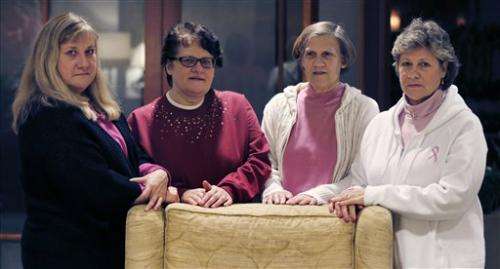Deal in US suit on pregnancy drug

(AP)—Four sisters who claimed in a lawsuit their breast cancer was caused by synthetic estrogen their mother took during pregnancy in the 1950s have reached a settlement with the drug company Eli Lilly and Co.
Attorney Julie Oliver-Zhang said the settlement, for an undisclosed amount, was reached on Wednesday, the second day of a trial in U.S. District Court in Boston. The sisters had not specified damages sought in the lawsuit.
Indianapolis-based Eli Lilly said it still believes its medication didn't cause the sisters' conditions but a settlement is in its best interest.
The sisters' case was the first to go to trial out of scores of similar claims filed in Boston and around the country. A total of 51 women have lawsuits pending in U.S. District Court in Boston against more than a dozen companies that made or marketed the drug.
DES, or diethylstilbestrol, was prescribed to millions of pregnant women over three decades to prevent miscarriages, premature births and other problems. It was taken off the market in the early 1970s after it was linked to a rare vaginal cancer in women whose mothers used DES.
Studies later showed the drug did not prevent miscarriages.
In an opening trial statement Tuesday, Aaron Levine, another lawyer for the sisters, said Eli Lilly failed to test the drug's effect on fetuses before promoting it as a way to prevent miscarriages.
James Dillon, a lawyer for Eli Lilly, told the jury there is no evidence the drug causes breast cancer in the daughters of women who took it. He also said that no medical records show the mother of the four women in the Boston case took DES or that if she did take it that it was made by Eli Lilly.
DES was not patented and was made by many companies.
The Melnick sisters, who grew up in Tresckow, Pennsylvania, say they all developed breast cancer in their 40s after their mother took DES while pregnant.
Levine told the jury that their mother did not take DES while pregnant with a fifth sister and that sister has not developed breast cancer.
The four Melnick sisters also had miscarriages, fertility problems or other reproductive tract problems long suspected of being caused by prenatal exposure to DES. They were diagnosed with breast cancer between 1997 and 2003 and had treatments ranging from lump-removal surgery to a full mastectomy, radiation and chemotherapy.
Dillon said that the doctor who treated the Melnick sisters' mother is now dead, and that there are no records of him prescribing DES. Dillon said Eli Lilly at the time recommended DES for women who had had three or more consecutive miscarriages.
The sisters' mother, he said, did not have consecutive miscarriages, so prescribing it to her would have gone against the company's recommendations. Dillon said leading researchers at the time recommended that DES be used for pregnant women.
Dillon told the jury that while it is "terribly unfair" that the four sisters got breast cancer, it is a common disease and doctors still don't understand what causes it.
Thousands of lawsuits have been filed alleging links between DES and vaginal and cervical cancer, as well as fertility problems. Many of those cases were settled.
Copyright 2013 The Associated Press. All rights reserved. This material may not be published, broadcast, rewritten or redistributed.

















